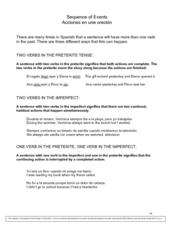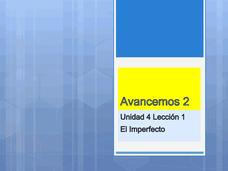Curated OER
Formal Commands (Mandatos)
How do you give a formal command in Spanish? Study the charts provided and complete the practice below. This resource is easy to follow and gives learners organized information for easy recall.
Curated OER
Contractions
Teach your class about contractions in Spanish. This resource provides explanations, examples, and a short practice section. Your learners will understand the two Spanish contractions in no time!
Curated OER
¿Qué hora es? What time is it?
This is a great reference guide for your middle and high schoolers learning how to tell time in Spanish. There are no practice opportunities provided, so consider pairing this with an exercise to get your learners using the information.
Weebly
Los Verbos Regulares
¿Qué haces ahora? Conjugate common Spanish verbs with a slideshow presentation that focuses on the present tense. As Spanish learners review personal pronouns and the parts of a verb, they work on forming the present tense with...
Curated OER
El tiempo presente de los verbos -er and -ir
Did you know that -ir and -er verbs in the present tense are conjugated almost the same? They only differ in the nosotros and vosotros forms. Review the chart at the top of the page before diving into the rest of the resource! Learners...
Curated OER
El verbo Ser-Explanation and Practice 1
The Spanish verb ser is one of the most important verbs for your beginning speakers to learn. This resource is stellar! First, there's a verb chart explaining the forms of the verb, then there's a fill-in-the blank practice section, and...
Curated OER
Do You know Saber and Conocer?
Ser and estar aren't the only Spanish words that have a similar meaning. Saber and conocer do too! This worksheet details the slight difference in meaning, organizes the information in two simple charts, and contains fifteen...
Curated OER
Formal Commands (Mandatos)
How do you give commands in Spanish? Use this well-organized resource to review formal commands. Extend the activity by having pairs write a dialogue between a mother or father and a small child in a candy store.
Curated OER
Familiar Commands
Familiar commands are probably used more frequently than formal commands, so make sure you spend an adequate time covering them. This worksheet provides great explanation, a clear chart, and a practice opportunity. It's a great way to...
Curated OER
Subjunctive in Noun Clauses
The subjunctive is used to express a wish, desire, or doubt. How is it used in noun clauses? This learning exercise gives an example of the subjunctive in a noun clause and explains the parts of the sentence. After reviewing the...
Curated OER
El Verbo ir- Explanation and Practice 1
The Spanish verb ir, meaning to go, is an important verb for your language learners to understand. Use the chart to help clarify its meaning and conjugation, then encourage your Spanish speakers to complete the fill-in-the-blank section...
Curated OER
El Tiempo Pretérito
What tense do you use to express actions that both began and ended in the past? El tiempo pretérito, of course! Review this reference guide with your beginning Spanish speakers to provide them with the basic information for forming the...
Curated OER
El verbo SER-Explanation and Practice 2
The verb "to be" is irregular in both Spanish and English. Give your Spanish-speaking learners this sheet to review the verb ser and practice conjugating it in the exercise that follows. Looking to extend this activity? Consider having...
Curated OER
El presente perfecto
Are you looking for a way to introduce the present perfect to your Spanish class? This reference guide is perfect! First it explains when we use the present perfect. There's a verb conjugation chart, several examples, and clear...
Curated OER
Sequence of Events
Your intermediate and advanced learners can expand their conversation skills when they learn how to express multiple past events in the same sentence. This reference guide provides helpful commentary, examples, and translations.
Curated OER
El Presente Progresivo
Looking for the perfect resource to educate your Spanish speakers on the present progressive? You've found it! This presentation details what the present progressive is, how one can form it, and what the irregular verbs are. Also...
Curated OER
Verb Sheet
Students complete template on the conjugation of any tense of verbs in Spanish, and then write teacher-dictated sentences using these verbs.
Curated OER
The Present & Imperfect Progressive
Starting off with present participles, this resource tackles the progressive with grammatical explanations, examples in English and Spanish, and an interactive practice exercise. Use the menu at the top of the webpage to navigate to each...
Curated OER
Tener
What does tener mean? Introduce your Spanish novices to this important verb. First, they fill out the conjugation chart. Next, they read the examples and explanation as a whole class. There's a short practice activity at the end to...
Curated OER
El Imperfecto
You class can learn all about how to form the imperfect with -ar and -er/-ir verbs. The slides do cover the only verbs that are irregular in the tense and the situations for which you use the imperfect (plus examples). Go over the...
Curated OER
Ojala y Quizas: El subjuntivo
The Spanish expressions meaning "hopefully" and "maybe" are always followed by the subjunctive. The top half of this worksheet provides an explanation and clear examples, while the bottom half provides a short practice section. For the...
Curated OER
Tu o Usted? Explanation and Worksheet 1
What is the difference between using tú or usted? This worksheet provides a thorough, clear explanation, and there's an opportunity to practice. The exercise lists different people and asks the learner to identify whether the informal or...
Curated OER
5 Question Review- Tener
Tener, the Spanish word meaning to have, is an essential vocabulary word for beginning Spanish speakers. Provide them with these five questions to assess their understanding of the verb in context. Consider having them translate each...
Curated OER
Present Progressive Tense
Teaching the present progressive? Your class needs this informative handout! Consider reading it through with them and stopping occasionally to provide practice opportunities or board examples.

























